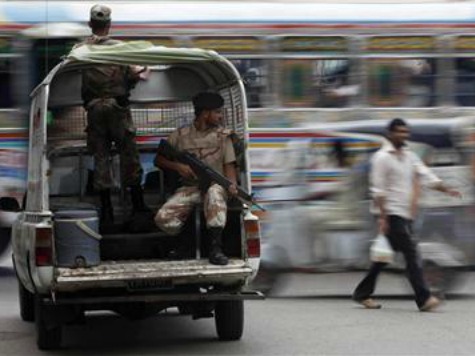 This morning’s key headlines from GenerationalDynamics.com
This morning’s key headlines from GenerationalDynamics.com
- Germany’s anti-Islam demonstrations become too large to ignore
- Pakistan Taliban crosses a red line with mass slaughter of army children
- Pakistan and Australia move from denial to shock
- Russia’s crisis deepens as ruble falls another 11%
Germany’s anti-Islam demonstrations become too large to ignore

PEGIDA demonstrators in Dresden on Monday (Reuters)
For each Monday in the past nine weeks, supporters of the explicitlyanti-Islam far right Pegida movement have been protesting in citieslike Dresden and Düsseldorf. (The phrase “far right” has differentmeanings in Europe and America.) The demonstrations have been growingin size from a few dozen to start to the 10,000 who demonstrated inDresden. Germany’s government ignored them at first, but the rapidgrowth of the demonstrations is forcing it to deal with them.Germany’s justice minister Heiko Maas said that the protests were “anembarrassment for Germany” and that the country was experiencing a new
Pegida is an acronym for “Patriotische Europaeer Gegen dieIslamisierung des Abendlandes,” which translates to “PatrioticEuropeans Against the Islamification of the West.” Much of thediscontent comes from the fact that Germany has accepted arecord number of refugees this year, especially from Syria,and has also witnessed the rise of Salafist movements in Germancities with heavy populations of immigrants.
Many of the complaints are about the economy. One elderly manshouted: “I’m a pensioner. I only get a small pension but I have topay for all these people (asylum seekers). No-one asked me!” However,a woman said, “I am not right wing, I’m not a Nazi. I am just worriedfor my country, for my granddaughter.” Deutsche Welle and BBC and Getty and Pegida facebook page
Pakistan Taliban crosses a red line with mass slaughter of army children
Terrorists from Tehrik-e-Taliban (TTP, Pakistan Taliban) attacked anarmy school in Peshawar in northwest Pakistan on Tuesday, killing 141people, 132 of them schoolchildren, most of them children of soldiers.The attack, which some argue is the worst in years, is beingdescribed as revenge for the army’s operations against the TTPin Pakistan’s tribal area.
During the last few years, the Taliban have splintered into threebranches — the Afghanistan Taliban, targeting US and Nato forces, thePakistan Taliban, and the Punjabi Taliban, attacking Indian targets.According to analyst reports I’ve heard, the army has good relationsthe first and third of these, but has lost control of the PakistaniTaliban.
Many Pakistani people believe that the Taliban are good people,defending their religion, and some even believe that the terroristattacks are being perpetrated by Iran or the U.S. to discredit theTaliban. Tuesday’s attack is thought to be so horrific that it willwash away these attitudes and change minds once and for all. Otherspoint to the bombing of the Marriott Hotel in Islamabad in 2008 that took place just a couple of blocksfrom the government buildings. That was also a horrific bombing, andit was thought that this attack would change mind permanently, butinstead, old attitudes took hold as soon as the initial shock woreoff.
Prime minister Nawaz Sharif ran his election campaign with a promiseto end TTP attacks by negotiating with the TTP. As we’ve describedmany times, these negotiations always were a farce, and were treatedwith contempt by the TTP. Tuesday’s attack should end those attemptsonce and for all though, although it has been noted that when Sharifcondemned Tuesday’s attack, he referred only to “terrorists,” and notto the Taliban.
Pakistan’s major opposition politician is Imran Khan, the formercricket superstar turned anti-American politician. He’s been evenmore supportive of the Taliban, calling for an end to American dronestrikes against the Taliban, and calling for the resignation of NawazSharif for allowing the drone strikes.
At the very least, this attack has infuriated the army, who are nowpromising revenge against the perpetrators. Daily Times (Pakistan) and Dawn (Pakistan)
Pakistan and Australia move from denial to shock
One of the characteristics of a generational Crisis era is theenormous state of denial about many things. Just one illustration ofthis in the US was the real estate bubble of the mid-2000s decade.Even though I wrote repeatedly about this bubble, starting in 2004,mainstream economists were ridiculously clueless about this, anddidn’t even begin to talk about the bubble until around 2009, when thereal estate crisis was in full flower.
Pakistan’s population have clearly been in denial about the dangerof the Taliban, despite major terrorist attacks every few days.Some of the attacks have targeted Sufi or Shia Muslims, butmost of them have been political, attacking the government orthe army by massacring civilians. Tuesday’s senseless attackon hundreds of schoolchildren in Peshawar has transformed thedenial to shock.
The terrorist attack in Sydney on Monday and Tuesday has had a similareffect on the people of Australia. Australia is a peaceful, open,generous, multi-cultured and inclusive country with strict gun controllaws, so Australia’s sense of denial took the form of believing that aterror attack would not occur there.
Now, Australians are waking up to the fact that dozens of youngAustralian men have gone to Syria to become jihadists.
The biggest political battle will probably be over gun control. Aftera 1996 gun massacre, strict gun control laws were imposed, and over amillion guns were destroyed in two buybacks since then. Now it’sbeing revealed that the number of guns is back to pre-1996 levels,thanks mainly to gun smuggling operations.
When a country’s population moves from denial to shock during agenerational Crisis era, then results can be very dangerous, becausenationalist forces may be triggered that leads to further shocks, andthen to a war. India Times and Daily Telegraph (Sydney) and Sydney Morning Herald
Russia’s crisis deepens as ruble falls another 11%
Russia’s desperate move yesterday,raising interest rates to 17%, seems to have backfired. The value ofthe ruble plunged another 11% against the dollar on Tuesday. It’s nowfallen 20% this week, and fallen more than 50% since the beginning ofthe year.
It may be that the currency crisis is now being driven by sheer panic,as Russia has several hundred billion dollars saved up in reserves.According to one analyst I heard, Russia could get revenge against thewest by bailing out Russian government debts denominated in dollars,but let the corporate debts denominated in dollars simply default.Since most of the holders of Russian dollar-denominated debt areEuropean banks and American investors, Russia could make the currencycrisis the West’s problem. Reuters
KEYS: Generational Dynamics, Germany, Heiko Maas, PEGIDA,Patriotic Europeans Against the Islamification of the West,Pakistan, Peshawar, Tehrik-e-Taliban, TTP, Pakistan Taliban,Nawaz Sharif, Imran Khan, Australia,Russia, ruble
Permanent web link to this article
Receive daily World View columns by e-mail

COMMENTS
Please let us know if you're having issues with commenting.